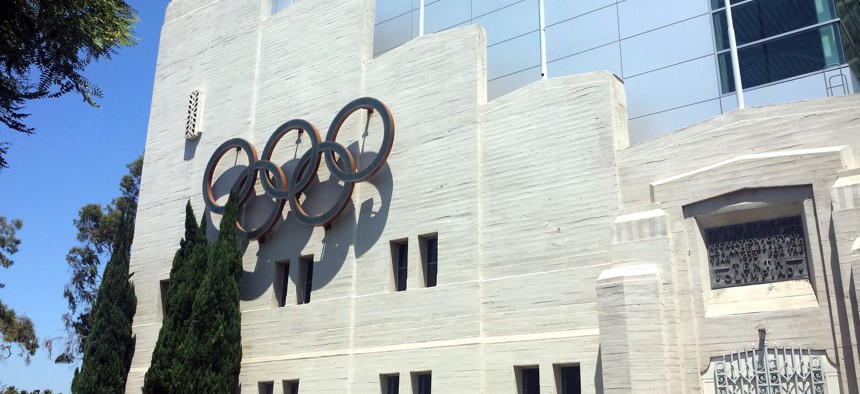Route Fifty Roadmap: A Municipal Parks and Rec Facility With Olympic Stature

The L.A. Swimming Stadium was used for the 1932 Olympic games. Michael Grass / RouteFifty.com

Connecting state and local government leaders
The L.A. Swimming Stadium, built for the 1932 games, isn’t your ordinary city pool.
Route Fifty Roadmap is an ongoing series of dispatches from the semi-regular travels of the Route Fifty staff around the United States. | PREVIOUSLY: Duluth, Minnesota
LOS ANGELES — This year’s Summer Olympics, getting underway in Rio de Janeiro this week, have been greeted with a shrug by some around the world. Outside of the actual athletic competition, the upcoming games have been plagued by headlines doubting the ability of Brazil, which is facing economic hardship, societal inequality, and continuing political turmoil, to successfully host the games. Many Olympics-related construction projects have been behind schedule, including a new rail line, which opened a few days before Friday’s opening ceremony. Then there are the ongoing fears over public health in Rio, including the Zika virus and unhealthy local water quality.
Beyond all the additional complexities that Rio is facing this year, many cities these days don’t feel that hosting the Olympics is a good investment of their local resources. There’s a long track record of the Olympic games straining finances, like in Montreal (the 1976 games nearly bankrupted Quebec’s largest city) or Athens (it’s been argued that the expensive investments made for the 2004 Summer Games helped trigger’s Greece’s fiscal crisis).
In the United States, there have been plenty of doubts about the risks about hosting such a large-scale event. A year ago, Boston bowed out after being selected as the official U.S. host city to compete for the 2024 summer games.
When Boston stepped aside last year in the face of a well organized campaign to rally public opposition, the U.S. Olympic Committee turned to Los Angeles as the nation’s best bet to win the right to host the 2024 Summer Games.
L.A. was an easy back-up choice. The City of Angels hosted the 1932 and 1984 Summer Olympics. The ’84 games are considered by many to be “the best-managed and most-successful Olympics competition in history,” according to the Los Angeles Times. The games returned with a $232 million surplus, with $93 million going to the city, funding youth sports programs through the LA84 Foundation.
And part of the Olympic legacy from 1932 continues to benefit Los Angeles.

Within view of the L.A. Memorial Coliseum in Exposition Park is the Los Angeles Swimming Stadium, built by the city and used for Olympic competition in 1932. The facility is managed by the L.A. Department of Recreation and Parks and is the only municipal aquatic facility in the U.S. that’s been used in Olympic competition. (It’s officially known as the LA84 Foundation / John C. Argue Swim Stadium.)
As someone who swims regularly, I couldn’t pass up an opportunity to swim in a former Olympic venue when I was visiting L.A. recently.
Following its use in the 1932 Olympics, the pool was used for competition and for municipal recreation, but by the time of the 1984 games, the pool was too outdated for competition.
Following the 1994 Northridge earthquake, the Los Angeles Swimming Stadium was closed and it sat abandoned, collecting graffiti. In 2003, a new aquatic facility, known as the LA84 Foundation / John C. Argue Swim Stadium, opened, using the structure’s historic facade and adding a glassed-in recreation facility within the footprint of the former viewing stands.

The facility has multiple pools. During my visit, adult lap swim was set in one of the short-course pools, with the Coliseum framing the background. For a little while, I had that pool all to myself.
If you’re used to swimming in indoor pools, swimming in outdoor facilities in Southern California and other warm-weather locales can be a bit of an adjustment—it can be hard to swim backstoke in a straight line with the sun overhead.
But the L.A. Swimming Stadium elevates that experience a bit: Getting ready to do a flip turn approaching the wall, the last thing you see before going below the waterline is the historic L.A. Coliseum.
And no other municipal parks and recreation department in the nation can boast such an Olympic view.
Michael Grass is Executive Editor of Government Executive’s Route Fifty and is based in Seattle.

NEXT STORY: More Shark-Detection Buoys in Mass.; Fantasy Sports Get OK to Resume in N.Y.





